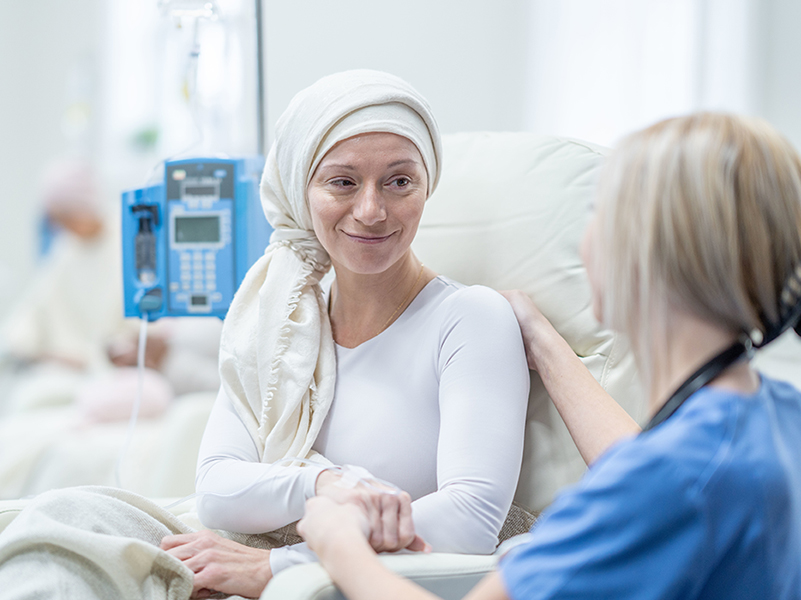“Like Nothing I’ve Ever Experienced”
Ryne Wilson, RN, OCN®, participated in the first-ever ONS Hackathon.
When ONS reached out and asked me to participate in the inaugural ONS Hackathon, I wasted no time in confirming my interest. I had heard of hackathons before but never a nursing-specific one. It was an exciting experience full of growth for me and the other oncology nurses who participated.
The two-week event opened on November 9, 2020, with introductory remarks from Brenda Nevidjon, MSN, RN, FAAN, ONS chief executive officer, and Michele Galioto, DNP, RN, CNS, executive director for the ONS Center for Innovation. Their welcoming and optimistic attitudes created an encouraging atmosphere and made me feel capable of solving big issues in oncology, which I needed because each team’s objective was to create innovative ways to improve access to cancer care.
About 15 nurses competed in the first Hackathon, which was hosted by a team of fun and extremely organized individuals from Hackworks, whose mission is to build competence and confidence in innovation. We were split into teams of two or three and asked to address one of four topics:
- Barriers to care related to prior authorization
- Ways to implement evidence-based testing into treatment planning
- Safe delivery of care, regardless of where the patient lives
- Geographical barriers to care delivery
Alongside teammates Rika Villar, MSHI, BSN, RN-BC, and Gina Quinlan, BSN, RN, CCM, BMTCN®, I developed a virtual gateway into the cancer center for patients who have trouble accessing care because of location-based barriers. Our solution, called CARE CORE (Care Reimagined: Centralized Oncology Resource Environment), was an all-inclusive, virtual hub for patients to access nearly all their cancer care needs from the comfort and safety of their home.
Throughout Hackathon, the hackworks team hosted multiple workshops that taught us the core principles of design and systems thinking. We learned how to incorporate human-centered design into solution building and effectively identify root causes of systematic issues. For my team, this was especially helpful as there are undoubtedly many multifaceted problems that contribute to disparities in cancer care. We also learned how to leverage existing and newly developing technologies in health care to build our solutions.
We heard from experts in the fields of artificial intelligence and healthcare technology about how they envision the future of health care and were able to incorporate these ideas into our solution as well. In the end, our team won the runner-up award, and I am so grateful for how this experience taught me innovative approaches to problem-solving.
I applied what I learned during the Hackathon to my nursing practice in the way I lead my institution’s outpatient nursing coordinating council. The council is responsible for the shared governance of our nursing practice initiatives. In my role as chair, I use design and systems thinking processes to help identify root causes of problems and build out potential solutions, just like we did for the Hackathon. This problem-solving strategy ensures we include multiple diverse perspectives, explore the problems thoroughly and systematically, and try solutions without risk of failure or blame. As Hackathon taught me, some solutions may not work at first when tackling systems issues, and that’s okay.
Hackathon was like nothing I’ve ever experienced. The freedom to be creative and fail forward was refreshing when much of our work as oncology nurses is otherwise restricted by protocol. I believe all nurses would benefit from opportunities like this. Hackathon and similar events teach us to build patient- and nurse-centered solutions that solve the cancer care issues of today and tomorrow. I appreciate that ONS offered this experience to its members and highly encourage anyone who can to attend in the future.
“I Loved Being Surrounded by Innovative Colleagues”
Megha Shah, BSN, RN, OCN®, was a competitor in the 2021 ONS Hackathon.
I discovered the ONS Hackathon at the Innovation Booth during the virtual ONS Congress® in April 2021. Like Ryne, I knew about hackathons and think tanks occurring in other fields like information technology (IT), but this was the only one I’ve seen in nursing. When I saw that ONS was focusing the next Hackathon on solving one of the most important challenges in oncology nursing—ineffective nursing resources in the ambulatory setting—I applied to participate. I’ve worked in the ambulatory oncology setting for eight years and couldn’t wait to contribute.
My Hackathon experience began on June 1, 2021, and more than 50 oncology nurses from across the United States participated. Our first event was a two-hour virtual session featuring an invigorating keynote speech by Anne Ireland, DNP, RN, AOCN®, CENP, oncology clinical specialist at ONS, who served as one of the Hackathon mentors. It inspired me to do the best I could to find solutions and reminded me that the healthcare organization I work for isn’t the only one struggling to staff ambulatory cancer centers.
Then the hackworks team outlined the plan for the next four weeks, explained what components we needed in our final pitches, and introduced us to the mentors who would be available to us for questions or moral support throughout the competition. Then we learned the most important piece of information: by the end of the first week, we would be divided into teams of seven or eight oncology nurses and work together to design a solution.
The next two weeks consisted of networking, brainstorming, creating ideas, and putting them into tools provided by the hackworks team. We had access to several on-demand and recorded sessions to learn the process of creating the perfect pitch for the judges.
The beauty of the experience was that it was virtual, and I did not have to take a single day off work to participate. The hackworks team also gave us an option to prerecord our pitch to play it for the judges instead of presenting live on the final day. Our team decided to prerecord the pitch because many of us live in different time zones and not everyone was going to be able to attend.
Because my team was spread throughout the country, one of our biggest challenges was deciding on a time to meet virtually. We all work in the ambulatory setting, so we solved the timing issue by meeting on the weekends or weeknight evenings.
Our team tackled the communication aspect of ambulatory staffing and developed a virtual tool that allowed staff to communicate with their charge nurse and the rest of the team in real time when they need help during the work shift.
On the day of the final pitch, we were nervous but excited to hear all the teams’ ideas and pitches. After hearing all the pitches during a two-hour presentation, our judges picked the winning team. Even though we didn’t win, my Hackathon experience was fun and rewarding.
Hackathon taught me leadership skills, exposed me to new avenues of communication and teamwork, helped me network with oncology nurses from across the United States, and connected me with some wonderful mentors. Even as a frontline nurse and not in a management position, this experience changed how I approached my practice: I’ve felt more empowered to make suggestions for improving the workflow at my institution, such as creating an acuity tool for ambulatory oncology staff and assigning staffing based on nurse-to-patient ratios.
The best part was being surrounded by innovative, creative, curious, and compassionate colleagues. Plus, ONS’s process allowed me to participate without missing any work. The resources and communication tools provided by the hackworks team were extremely organized and easy to learn and use, and my team felt well supported throughout the entire experience.






